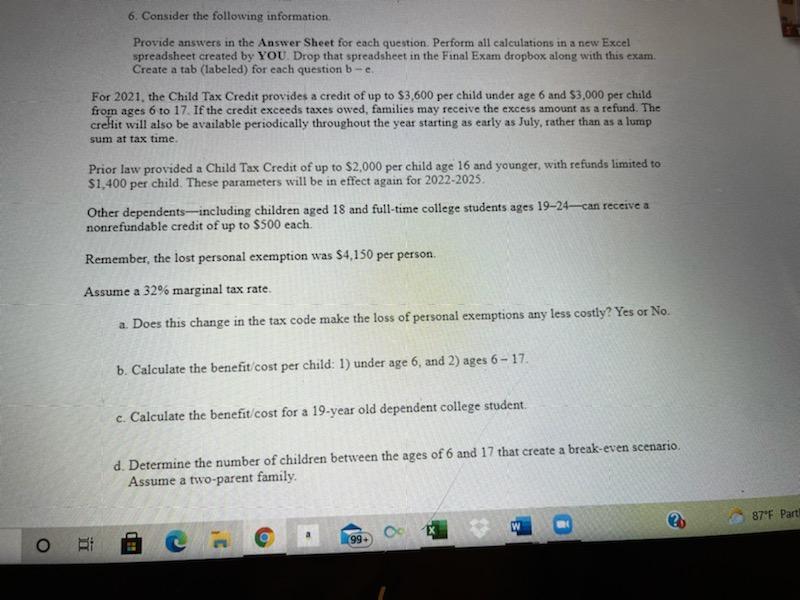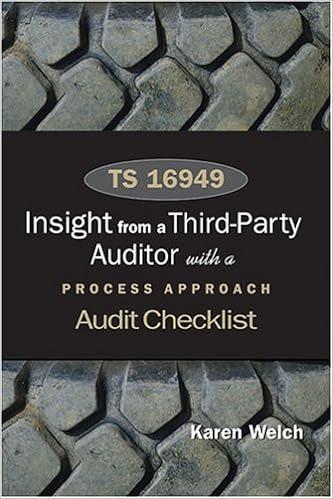Answered step by step
Verified Expert Solution
Question
1 Approved Answer
Please show all work 6. Consider the following information Provide answers in the Answer Sheet for each question. Perform all calculations in a new Excel

Please show all work
6. Consider the following information Provide answers in the Answer Sheet for each question. Perform all calculations in a new Excel spreadsheet created by YOU Drop that spreadsheet in the Final Exam dropbox along with this exam. Create a tab (labeled) for each question b-e. For 2021, the Child Tax Credit provides a credit of up to $3,600 per child under age 6 and $3,000 per child from ages 6 to 17. If the credit exceeds taxes owed, families may receive the excess amount as a refund. The cre it will also be available periodically throughout the year starting as early as July, rather than as a lump sum at tax time. Prior law provided a Child Tax Credit of up to $2,000 per child age 16 and younger, with refunds limited to $1,400 per child. These parameters will be in effect again for 2022-2025. Other dependents-including children aged 18 and full-time college students ages 19-24-can receive a nonrefundable credit of up to $500 each Remember, the lost personal exemption was $4,150 per person. Assume a 32% marginal tax rate. a. Does this change in the tax code make the loss of personal exemptions any less costly? Yes or No. b. Calculate the benefit cost per child: 1) under age 6, and 2) ages 6 - 17. c. Calculate the benefit cost for a 19-year old dependent college student d. Determine the number of children between the ages of 6 and 17 that create a break-even scenario Assume a two-parent family. 87F Parti W Ri (99- 6. Consider the following information Provide answers in the Answer Sheet for each question. Perform all calculations in a new Excel spreadsheet created by YOU Drop that spreadsheet in the Final Exam dropbox along with this exam. Create a tab (labeled) for each question b-e. For 2021, the Child Tax Credit provides a credit of up to $3,600 per child under age 6 and $3,000 per child from ages 6 to 17. If the credit exceeds taxes owed, families may receive the excess amount as a refund. The cre it will also be available periodically throughout the year starting as early as July, rather than as a lump sum at tax time. Prior law provided a Child Tax Credit of up to $2,000 per child age 16 and younger, with refunds limited to $1,400 per child. These parameters will be in effect again for 2022-2025. Other dependents-including children aged 18 and full-time college students ages 19-24-can receive a nonrefundable credit of up to $500 each Remember, the lost personal exemption was $4,150 per person. Assume a 32% marginal tax rate. a. Does this change in the tax code make the loss of personal exemptions any less costly? Yes or No. b. Calculate the benefit cost per child: 1) under age 6, and 2) ages 6 - 17. c. Calculate the benefit cost for a 19-year old dependent college student d. Determine the number of children between the ages of 6 and 17 that create a break-even scenario Assume a two-parent family. 87F Parti W Ri (99Step by Step Solution
There are 3 Steps involved in it
Step: 1

Get Instant Access to Expert-Tailored Solutions
See step-by-step solutions with expert insights and AI powered tools for academic success
Step: 2

Step: 3

Ace Your Homework with AI
Get the answers you need in no time with our AI-driven, step-by-step assistance
Get Started


